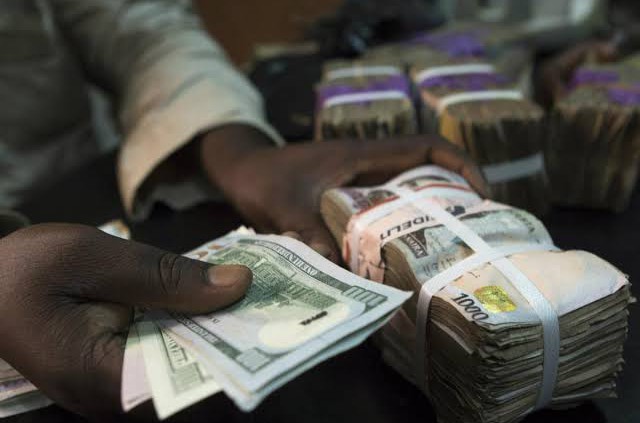Business
Naira defies CBN’s intervention over demand pressure

Recent resumption of intervention by the Central Bank of Nigeria (CBN), is not making enough liquidity available to abate demand pressure in the nation’s foreign exchange market, prompting calls for more interventions and other decisive steps.
The pressure on the naira has intensified in the last one week following strong demand for dollars by individuals traveling for the summer holidays and for school fees payments, according to traders.
After what looked like a recovery of the local currency from week-long losses, following an increase in dollar supply by 62.81 percent at the official forex market on Wednesday, the naira appreciated in both the parallel and official markets on Friday.
Nigeria’s currency had on Tuesday slumped to a four-month low of N1,621.12 per dollar, following strong demand on the official FX market.
However, after trading on Wednesday, the naira gained 0.76 percent as the dollar was quoted at N1,608.73 compared to N1,621.12 seen on Tuesday at the Nigerian Autonomous Foreign Exchange Market (NAFEM), according to the data from the FMDQ.
The dollar supplied by willing buyers and willing sellers increased by 62.81 percent to $270.81 million on Wednesday from $166.34 million recorded on Tuesday.
During the intraday trading, FX market participants quoted the dollar at a high rate of N1,645 on Wednesday as against N1,635. The intraday low closed at N1,399.04 on the same day from N1,546 per dollar closed on Tuesday. At the parallel market, also known as the black market, the naira traded at N1,610 per dollar on Wednesday compared to N1,600/$ on Tuesday.
The gain continued on Thursday but was lost on Friday when the naira depreciated to N1,590 per dollar in the parallel market from N1,580/$ the previous day.
Similarly, in the NAFEM on Friday, the local currency depreciated to N1,617.08 per dollar from N1,570 per dollar on Thursday, indicating N47.08 depreciation for the naira.
The volume of dollars traded in the market declined by 7.6 percent to $131.55 million from $142.32 million traded on Thursday. Consequently, the margin between the parallel market and the NAFEM rate widened to N27.08 per dollar from N10 per dollar on Thursday.
The CBN had in a renewed determination to promote stability and reduce volatility in the forex market a couple of weeks ago, resumed intervention by selling the sum of $122.67 million to 46 authorised dealers.
Cautious optimism
Experts had said the intervention would reduce demand pressure on the forex market by making more liquidity available, while also strengthening the naira, but called for sustainability of the effort.
Dr Muda Yusuf, CEO of the Centre for the Promotion of Private Enterprise (CPPE) said, “It is supposed to strengthen the naira. The naira stability is a function of demand and supply. In recent days, the naira seems to have come under pressure. This is likely to moderate the pressure.
He said what is important is the consistency and sustainability of the intervention. “We need to generate that confidence to prevent people from speculating against the naira. The naira stability is very important. So, I think it is a good thing that they intervened,” Yusuf further said.
Within the week under review, Bureau De Change (BDC) operators in the country called on the CBN to increase its intervention to stem the high volatility and enhance confidence in the forex market.
Aminu Gwadabe, president of the Association of Bureau De Change Operators of Nigeria (ABCON), in a statement, said despite significant interventions by the CBN, including the injection of millions of dollars into the interbank market, the naira has fallen to a new low of N1621 per US dollar at the NAFEM window.
Gwadabe, who commended the CBN for resuming foreign exchange sales to BDC operators, however, emphasised that more decisive actions were needed, urging the apex bank to collaborate more closely with authorised dealers, who he described as crucial for maintaining adequate liquidity and reducing volatility in the retail forex market.
“The BDCs remain the most effective tool of foreign exchange policies of the apex bank,” Gwadabe stated. “We provide an efficient demand monitoring mechanism and price stability in the retail end of the market.”
To address the current crisis, Gwadabe called for increased volumes and frequencies of CBN interventions through BDCs. He also urged the CBN to reconsider the stringent requirements for BDCs’ reapplication for licenses and to extend the deadline for these applications.
Crude in naira
President Bola Tinubu, penultimate week directed the Nigeria National Petroleum Company Ltd (NNPCL), to sell crude oil to Dangote Refinery and other local refineries in naira instead of foreign currency, particularly the U.S. dollar to further tackle forex volatility among other issues.
The Executive Chairman of the Federal Internal Revenue Service (FIRS), ZacchAdedeji, during a recent Federal Executive Council (FEC) meeting at the State House in Abuja, emphasized that conducting crude oil sales in naira would significantly reduce the pressure on Nigeria’s foreign exchange reserves.
According to Adedeji, Nigeria currently spends approximately 30 percent to 40 percent of its forex on importing petrol, translating to about $600 million monthly or $9.72 billion annually.
By selling crude oil and purchasing refined products from the Dangote Refinery in naira, he said, the country could reduce this expenditure by 94 percent, saving $7.32 billion annually.
“What does this mean to us? The pressure on foreign exchange rates today will be reduced. We spend roughly 30 to 40 percent of our forex on the importation of PMS that we consume. That will be drastically reduced,” Adedeji explained.






